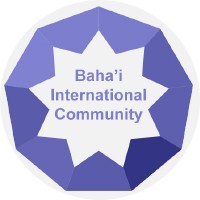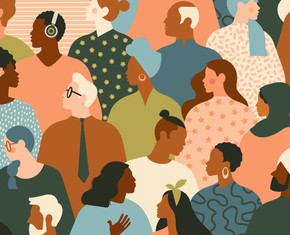The views expressed in our content reflect individual perspectives and do not represent the authoritative views of the Baha'i Faith.
Humanity’s existence is governed not only by physical forces, but also by social and moral laws of cause and effect.
Greed is inherently corrosive to the common good, no matter how artfully justified or concealed.
Acts of selfless compassion invariably hold the power to motivate and inspire, no matter how seemingly simple or isolated.
From this perspective, the path to a more harmonious relationship with nature cannot be one of technological adjustment alone. It must also involve communities and societies learning to align themselves with higher principles.
Unlocking the high-minded qualities latent in every individual has been a central concern of religious teachings and ideals for millennia. That fanaticism and sectarian dogmatism have undermined the moral and ethical imperatives that lie at the heart of so many faith traditions can hardly be denied.
Nevertheless, communities that are actively laboring to put transcendent values into practice, for the betterment of all, represent a reservoir of experience worthy of serious consideration. “Man’s merit lieth in service and virtue and not in the pageantry of wealth and riches,” asserts Baha’u’llah, providing one example, among many, of an approach to personal identity and collective interaction that is grounded in values transcending material prosperity alone. How such ideals come to infuse the thinking and behavior of growing numbers, and how this process can be consciously fostered and accelerated, are questions of central importance to the environmental movement and to humanity as a whole.
Science and Religion: Complementary Systems of Knowledge and Practice
In working to build a more sustainable world, humanity has at its disposal two mutually reinforcing systems of knowledge and practice: science and religion.
Scientific inquiry has been a vital instrument in seeking to understand physical reality and in forging innovative solutions based on a search for truth and a commitment to learning. When combined with values such as freedom from prejudice and bias, it has enabled humanity to separate fact from conjecture.
Scientific capabilities — of observing, measuring, rigorously testing ideas — have allowed us to construct a coherent understanding of the laws and processes governing physical reality, as well as to gain insights into human conduct and the working of society. Far from being the province of researchers and academics alone, the methodologies of scientific inquiry are tools that any individual or community can employ.
For its part, religion provides a framework by which high ideals can be applied to individual lives and to the life of society, for the betterment of all. The spiritual principles animating the world’s enduring religions have aided individuals and entire populations to grapple with questions of meaning, purpose, and the nature of the good life and the good society. When true to these ideals, religion has provided a bulwark against ideologies of materialism that would reduce human beings to mere resources to be exploited or consumers to be satiated.
At its highest, religion has not only raised the call to virtues such as integrity, good character, high resolve, cooperation, and sacrificial endeavor, but drawn growing numbers together around such principles, unifying disparate elements, and giving rise to cohesive communities working to manifest high ideals in practice.
Taken together, science and religion provide fundamental organizing principles by which lasting progress can be made. When both the material and spiritual dimensions of humanity are kept in mind, and due attention is given to both scientific and spiritual knowledge, the tendency to reduce human progress to the consumption of goods, services, and technological packages is avoided. Both science and religion are essential to the liberation of individuals and communities from the traps of ignorance and passivity. Both are vital to the advancement of civilization.
Religion and science are the two wings upon which man’s intelligence can soar into the heights, with which the human soul can progress. – Baha’i holy writings.
Justice as Process and Outcome
Central to any authentic conception of oneness at a planetary level are issues of justice.
That widespread suffering has resulted from humanity’s extractive relationship with the natural world, that a select few benefit from excessive use of the earth’s resources to the detriment of many others, that immediate preferences often override the basic needs of future generations — these reveal profound injustices to people and planet.
Correcting such ills will require an honest reckoning, along with creativity, perseverance, and humility in response.
The voices of those who have been disadvantaged by the current order will need to figure far more prominently into decision-making processes at all levels. Insight will need to be sought from populations sustaining more harmonious relationships with the natural world, many of whom live in areas other than urban centers. Diverse cultural understandings of humanity’s relationship with the natural world, especially those of indigenous peoples, can provide needed insights into the creation of more holistic and sustainable models for present and future generations.
Justice demands a wide range of outcomes — that the benefits of human civilization be distributed with equity, for example, or that responsibility for undertaking necessary transitions be apportioned in light of actors’ historic contributions to the present climate crisis. But justice at the level of outcome is established only through the operation of justice at the level of process.
At the individual level, justice calls for fair-mindedness in one’s judgments and equity in one’s treatment of others. At the group level, it is the practical expression of awareness that the interests of the individual and those of society are inextricably linked. It also requires a standard of truth-seeking far beyond the patterns of negotiation and compromise that tend to characterize present-day relations — a process of consultation and decision-making that is principled, candid, and fact-based. At all levels, the capacity to manifest justice — and commitment to doing so — must be strengthened. Just and equitable relationships are indispensable foundations for any unified global movement for the common good.
Learning as a Mode of Operation
A global civilization in a sustainable relationship with the natural world has never existed. Laying its foundations in numerous localities, reflecting a vast spectrum of social and ecological circumstances, therefore calls for a process of learning on a global scale.
Basic requirements and foundational principles have been identified in numerous areas, ranging from physical processes to policy frameworks. Yet the wise application of principles to specific instances of social transformation is something that can only be learned through experience.
To take learning as a central objective of environmental action calls for specific habits and behaviors. When operating in a mode of learning, visions and strategies are reexamined time and again. Plans grow organically over time and are modified in light of action taken, experience generated, and lessons learned. Action is process-oriented, rather than solely defined by events or projects. Haphazard change is avoided and continuity of effort is maintained.
Genuine learning hinges as much on the motive and intent of actors, as on formal structures and processes.
An international conference characterized by concern for status and reputation, or credit and blame, for example, will struggle to generate useful insights, no matter how many sessions are devoted to the sharing of best practices or lessons learned. An orientation toward learning also requires understanding of the role of mistakes and setbacks in the path of progress. Whereas the scientific method makes full use of the dialectic of trial and error, international processes are often consumed by a search for the perfect program or policy from the outset. This must be replaced by a culture of exploration and an earnest search for appropriate solutions, in full recognition that all involved will, at times, encounter setbacks and fall short.
Humility is the gateway to learning. Vital to a mode of learning in action is the principle of consultation, understood as the process of building consensus about the truth of a situation and determining the wisest course of action among available options. In a consultative process, individual participants strive to transcend their respective points of view, and function instead as members of a collective with its own aims and goals. In an atmosphere characterized by both candor and courtesy, ideas belong not to the individual to whom they occur, but to the group as a whole. Truth is not treated as a compromise between opposing interest groups, nor are participants animated by the desire to control one another. The aim is to harness the power of unified thought and action. And the perspectives and aspirations of those whose lives will be impacted by decisions are kept in mind at all times.
Building more sustainable societies involves not only the application of existing knowledge, but also the generation of new knowledge. Much of this will take the form of insights acquired through experimentation at the local level. Initial observations may consist of little more than personal accounts of grassroots actors. But over time patterns emerge which can be documented and analyzed, leading to an increasingly rich body of knowledge which can be disseminated back to the grassroots and used to shape subsequent efforts. Conceived in this way, learning about the construction of a sustainable world becomes the province not of a limited group of experts alone, but rather an endeavor both relying on and welcoming the contribution of the masses of humanity.
Knowledge is as wings to man’s life, and a ladder for his ascent. Its acquisition is incumbent upon everyone. – Baha’i holy writings.
Proposals for Exploration
Justice demands coherence between word and deed. Beyond establishing new bodies or concluding new agreements, therefore, the international community must make the fulfillment of promises already made a keystone of all future efforts. In doing so, it can help reestablish stores of trust which have become perilously depleted in recent years — trust in elected authorities, trust in news media, trust in the findings of science, and trust in the commitments made by world leaders.
Within current structures, global arrangements could be made more just by establishing means to estimate and model the effects that proposed policies would have in the future. Such a forward-looking orientation, as seen, for example, in the proposed United Nations Special Envoy for Future Generations and building on the lessons learned from localities that have instituted such an approach, would help insulate decision-making from narrower interests of present actors and prioritize medium and long-term equity and stewardship.
Much remains to be learned about models of society that prioritize ethical principles and actively foster their development and application throughout a population. Establishing within each United Nations agency a focal point of learning about the practical application of moral and ethical principles, rather than simply seeking ready solutions, could generate knowledge about how advancement can be promoted across the full range of human experience. A notable alternative to the paradigm of material advancement alone can be found in the significance that multitudes around the world place in the transcendence of the human spirit and its connection with the divine.
Much could be learned from a systematic and scientific inquiry into communities that are learning to apply spiritual principles — such as selflessness, solidarity with others, and stewardship for the natural world — to advance broad-based social progress. In addition to various United Nations initiatives already focused on engagement with faith-based organizations, such an inquiry could explore alternative sources of motivation and inspiration, and the impact they can have on community and environmental well-being
















Comments
Sign in or create an account
Continue with Googleor